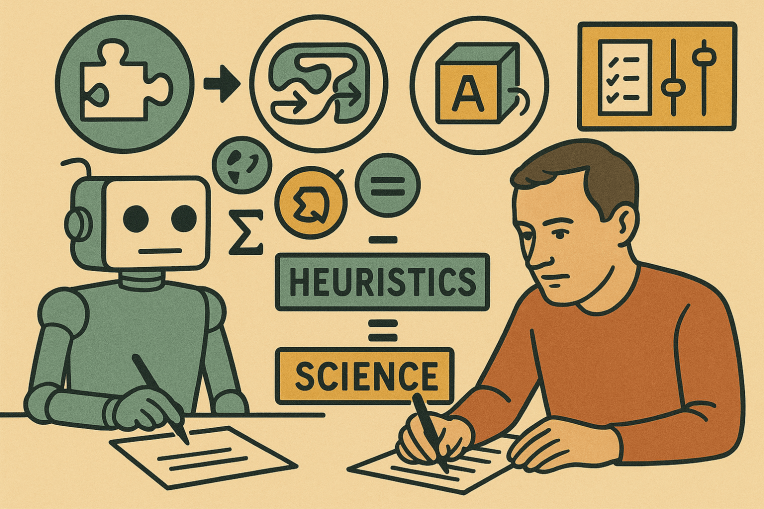All Scientific Knowledge is Heuristic
Science as Structured Approximation
Series index:
All Scientific Knowledge is Heuristic ← you are here
A heuristic is a rule-of-thumb or disciplined shortcut that guides reasoning, decision-making, or discovery under uncertainty. By ignoring some variables to make others tractable, heuristics turn overwhelming complexity into workable problems. In science, this is not a drawback, it is the method itself (Box and Draper 1987). Models, measurements, and optimisations rely on heuristic construction, and each field advances by testing and reorganising these approximations.
Deduction within heuristic premises
Deductive reasoning is often held up as the most rigorous scientific tool, yet its conclusions depend on assumptions chosen for tractability, not realism. Newtonian mechanics posits point masses and friction-free planes; economics postulates perfectly rational agents with complete information. These premises simplify but misstate the world. The logical form is valid, but the content is heuristic and provisional (Popper 1959). Deduction in science always operates inside deliberately incomplete models.
Measurement as model-laden observation
Empirical work is equally heuristic. Instruments have resolution limits, data are sampled and cleaned, and variables such as “temperature” or “intelligence” or “accessibility” or “congestion” exist only through operational definitions. Choices about what and how to measure reflect prior theory, replication relies on threshold conventions. Measurements are structured data products, not raw facts (Tversky and Kahneman 1974). Recognising their heuristic scaffolding keeps error transparent and informative.
Progress through paradigm exchange
Scientific progress rarely discards older theories outright. It shifts their scope and usefulness. Newtonian mechanics still predicts at human scales, even though relativity subsumes it. Classical thermodynamics stands, grounded in statistical mechanics. Quantifying congestion is secondary to the broader goals of measuring travel time, which itself is one element of maximising accessibility. Paradigm shifts reorganise assumptions and problem frames, trading one heuristic bundle for another (Kuhn 1962). Progress is iterative refinement of what works, under known limits.
Optimisation, theory versus practice
In theory, theory and practice are the same, in practice they are not.
Textbook optimisation presumes a stable objective, complete constraints, and often convex landscapes that guarantee a single global optimum. Real problems violate those conditions. Objectives are proxies, constraints conflict, solution spaces are rough, and algorithms settle for satisficing rather than perfection (Simon 1969). The gap between pristine theory and messy practice exposes optimisation as a controlled heuristic search.
Language on the move
Core scientific terms, “force,” “gene,” “utility,” “risk,” shift meaning across successive models. They remain stable enough to support research, yet flexible enough to evolve. Precision is local to each framework, outside it, concepts are reinterpreted, not relativised. This controlled plasticity is another organised heuristic, keeping discourse coherent and adaptive.
Science as the curation of heuristics
Science does not eliminate error, it manages it. Theories are judged by the predictions, explanations, and interventions they enable, not by final truth. Heuristics are refined through exposure to potential failure: experiment, computation, replication. The comparative advantage of science is its institutional ability to organise, test, and layer these disciplined approximations into a cumulative toolkit.
Claim: Heuristic reasoning is not a temporary compromise, but a permanent feature of inquiry. Truth, in this view, is a guiding limit, not an achievable state.
References
Box GEP, Draper NR (1987) Empirical Model-Building and Response Surfaces. Wiley.
Kuhn TS (1962) The Structure of Scientific Revolutions. University of Chicago Press.
Popper KR (1959) The Logic of Scientific Discovery. Hutchinson.
Simon HA (1969) The Sciences of the Artificial. MIT Press.
Tversky A, Kahneman D (1974) “Judgment under Uncertainty: Heuristics and Biases.” Science 185(4157): 1124–1131.


